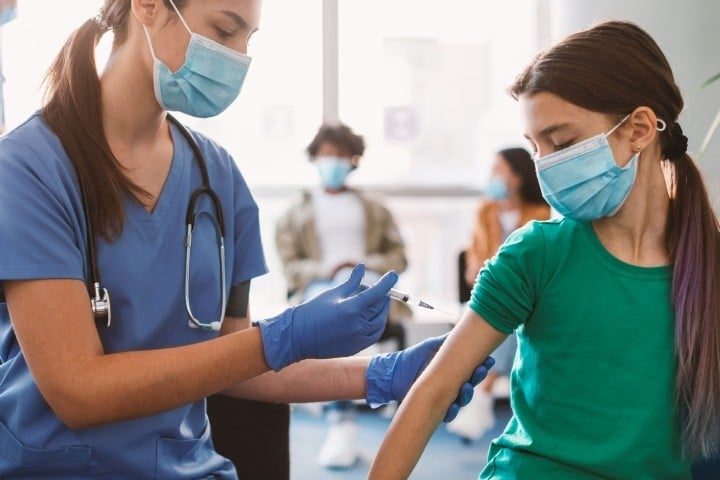
Pfizer-BioNTech’s two-dose COVID shot provided abysmal protection for children aged five to 11 during the wave of Omicron infection in New York, a study published Monday revealed. Researchers suggested increasing the dose for younger children to boost the protection rate.
According to the new study from the New York State Department of Health, “There is limited evidence on the effectiveness of the BNT162b2 vaccine for children, particularly those 5-11 years and after the Omicron variant’s emergence.”
The study showed a dramatic and rather swift drop of the shot’s effectiveness in preventing infections and hospitalizations.
During the Omicron surge from December 13, 2021 through January 30, 2022, the effectiveness against infection plunged from 68 to just 12 percent for children in that age group. Protection against hospitalization dropped from 100 to 48 percent during the same period.
The study also compared 11-year-olds and 12-year-olds during the weekend ending January 30. They found the vaccine effectiveness plummeted to 11 percent for the low-dosage group but offered a 67-percent protection rate to the group that received the higher dose.
Currently, the Pfizer dosage for children aged 5 to 11 is 10 micrograms, and for children and adolescents aged 11 to 17 it is 30 micrograms.
“This is super interesting because it would almost suggest that it’s the dose that makes the difference,” reacted Florian Krammer, an immunologist at the Icahn School of Medicine at Mount Sinai.
In light of the underwhelming results, the paper suggested “studying alternative vaccine dosing” for children. The authors recommended continuing practicing “layered protections” such as masking.
At the same time, the study found that the shots “were protective” against severe illness, and therefore the New York researchers endorsed their use.
“It’s disappointing, but not entirely surprising, given this is a vaccine developed in response to an earlier variant,” said Eli Rosenberg, deputy director for science at the New York State Department of Health and lead of the study.
According to The New York Times, Dr. Rosenberg briefed top CDC officials, including Dr. Rochelle Walensky, the agency’s director, with findings in early February. The findings were also shared with the top officials from the Food and Drug Administration (FDA).
The outlet added that the data were “generally consistent with a report from Britain showing that vaccine effectiveness against symptomatic infection in adolescents aged 12 to 17 years drops to 23 percent after two months.”
CDC program manager for COVID vaccine efficacy Ruth Link-Gelles seemingly dismissed the New York study, per STAT News.
“When you look at the whole picture, we’re not seeing that signal that New York State is seeing,” she said, and cited the agency’s own study that showed the protection offered by the shots was actually much higher.
According to that CDC study, published in mid-February, vaccine effectiveness against severe illness from Delta and Omicron between August 2021 and January 2022 was between 34 to 45 percent for adolescents ages 12 through 17 and 51 percent for children ages five through 11.
The CDC admitted, however, that “Protection against COVID-19 after 2 doses of mRNA vaccine wanes,” adding that “little is known about durability of protection after 3 doses.”
Kathryn Edwards, a vaccine expert at Vanderbilt University, who spoke with STAT News, added that the New York study did not convince her that the dose for younger children should be increased.
Both Edwards and Link-Gelles implied more study, over a longer period of time, is needed to get “a true sense” of how well the Pfizer shot “is working in children.” Notably, the inoculation of children in that age group, from five to 11, started in November 2021. Per the most recent data, 26 percent of American children in that group have been fully vaccinated.
While the CDC currently recommends everyone older than 12 receive a booster shot when eligible, there is no such recommendation for younger children.
The safety of the COVID shots for children remains a pressing issue for many American parents, yet the U.S. federal agencies do not consider it to be serious.
From the vaccines’ rollout on November 3 to December 3, 2021, the Vaccine Adverse Effect Report System (VAERS) and the v-safe vaccine safety-tracking system received 4,249 adverse-event reports after the administration of 8.7 million COVID-19 vaccine doses to children aged five to 11, per a report from the Center for Infectious Disease Research and Policy. Of them, “only” 2.4 percent, or some 101 children, experienced adverse events considered “serious.” In other words, these children required hospitalization or long hospital stays, developed life-threatening conditions, were permanently disabled, or died.
Notably, nearly 60 percent of children enrolled in v-safe did not tolerate COVID shots very well. Per the report,
Of the 42,504 children in this age-group enrolled in v-safe, 57.5% had local reactions, and 40.9% had systemic reactions, including pain at the injection site, fatigue, and headache. In the week after receipt of the first vaccine dose, 54.8% of children had local reactions, while 40.9% had systemic reactions. Adverse systemic reactions were more common in the week after the second dose (40.9%) than after the first, with fever occurring in 13.4%, versus 7.9% after the first dose.”
In November 2021, the world’s top non-establishment doctors urged parents not to vaccinate their children against COVID, arguing the long-term impact of the vaccines may be detrimental to children’s health, while the benefits are statistically nonexistent, as reported by The New American.





